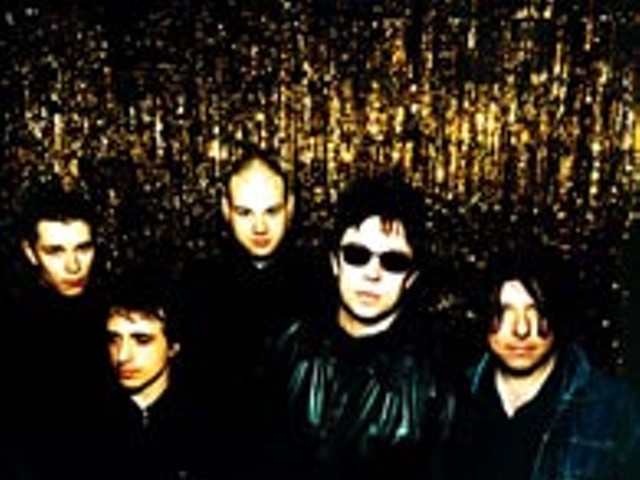Perhaps the biggest radio hit of 2000 was “The Real Slim Shady,” a scatological, sexually lurid rap song from Eminem’s Grammy-nominated The Marshall Mathers LP.
But if you wanted the raw, uncensored version, you had to buy the CD. The version that was played thousands of times on radio stations across the country had been edited to eliminate all the dirty words. That way, broadcasters wouldn’t get in trouble with the Federal Communications Commission.
Or not, as it turns out. In a decision that is as chilling as it is mind-boggling, the FCC earlier this month fined KKMG-FM based in Colorado Springs, Colo., for playing the edited version of “The Real Slim Shady” — the exact same version you heard so many times last summer. Even after the song had been cleaned up, the FCC ruled, “portions of the lyrics contain sexual references in conjunction with sexual expletives that appear intended to pander and shock.”
How was it that KKMG was singled out and fined $7,000? Opportunity, plain and simple. An offended listener filed a complaint with the FCC, complete with a lyric sheet she had downloaded from the Internet. And the FCC acted on the complaint.
In other words, what happened in Colorado Springs could happen anywhere.
Unfortunately, the decision says a lot about George W. Bush’s FCC chairman, Michael Powell. When it comes to the desires of huge media conglomerates to combine and expand, Powell is a classic libertarian. But when it comes to artistic freedom, he has no problem enforcing government regulations of the most onerous sort.
The silencing of Eminem — indeed, the FCC’s entire regulatory structure — is based on the perceived need to protect children from whatever the mainstream deems to be naughty.
“Protection of children is a frequent justification that’s used for censorship that’s essentially based on taste or morality rather than any well-founded psychological understanding of adolescent development,” says Marjorie Heins, director of the National Coalition Against Censorship’s Free Expression Policy Project. And Heins cites an even more egregious example of FCC censorship: a $7,000 fine recently levied against KBOO-FM, a small, community station in Portland, Ore., for playing Sarah Jones’s feminist rap song “Your Revolution,” with its defiant line, “Your revolution will not happen between these thighs.”
The action against KKMG comes just two months after the FCC issued a 28-page policy statement to clarify the rules against indecent or obscene speech. The statement — nearly seven years in the making, and drafted in response to a previous case — is supposed to illuminate existing guidelines rather than promulgate new ones. But the statement readily lends itself for use as a new weapon by the forces of censorship.
(By the way, the statement — which consists mainly of examples of speech on both sides of the indecent-decent divide — may be the most sexually exciting government document since the Starr Report. To download it, go to www.fcc.gov/Bureaus/Enforcement/News_Releases/2001/nren0109.html. Don’t be shy: Your tax dollars helped pay for it.)
The policy statement isn’t the only thing that’s new. It’s no secret that Bush got elected in part by pandering to the pro-censorship forces of the religious right. Chairman Powell’s views on free speech are not well established.
What is known about the son of Secretary of State Colin Powell is that he is something of a fetishist when it comes to free markets. The Telecommunications Act of 1996 allows a handful of mega-corporations to buy up most of the country’s 10,000 radio stations. Even before Powell’s ascension, the agency approved the merger of AOL and Time Warner with barely a whimper.
But that wasn’t good enough for Powell. Recently he led the FCC in overturning a long-standing rule that prohibited one broadcast network from acquiring another, thus allowing Viacom, which already owned CBS, MTV, VH1, Infinity, and a host of other media properties, to gobble up UPN. Powell is also looking into relaxing the long-standing rule banning corporations from owning newspapers and broadcast stations in the same market — perhaps more sensible than some of his other positions, but of a piece with his deregulatory zeal.
“It’s just disingenuous not to focus on the fact that the media landscape looks dramatically different in 2001 than it did in 1976,” Powell recently told the Associated Press. He was talking about the rise of the Internet, cellular services, and other technological advances, but he could just as well have been referring to the demise of such social goods as the Fairness Doctrine, local ownership, and public-service requirements.
KKMG officials have said they’re going to fight the $7,000 fine they got for playing the sanitized version of “The Real Slim Shady,” and well they should. But here are some facts that may give you pause. The station is owned by Citadel Communications, which, according to its corporate Web site, operates 139 FM and 65 AM stations in 42 markets. In January of this year, Citadel reached an agreement to be purchased by an affiliate of Forstmann Little & Company — “a leading acquirer and owner of businesses” — for stock estimated to be worth $2 billion.
That tells you everything you need to know about modern corporate radio, with its abandonment of local communities and its relentless focus on the bottom line. And it’s a hell of a lot more indecent than anything Eminem ever rapped about Christina Aguilera.
You can send letters of protest to FCC Chairman Michael Powell by e-mail at [email protected], or by regular mail at 445 12th St. SW, Washington, DC 20554.
Dan Kennedy is a media critic for the Boston Phoenix. Send comments to [email protected]




